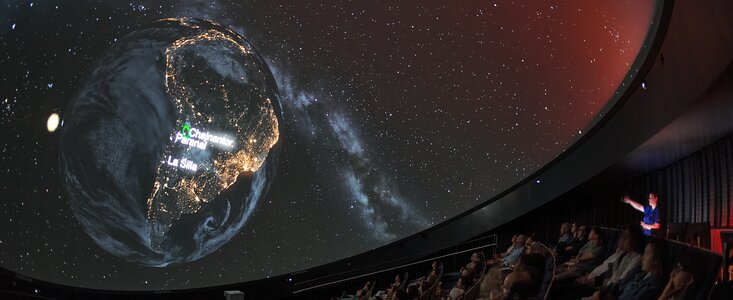es2531de — Organisation Release
Deutsche UNESCO-Kommission würdigt Arbeit der Planetarien als immaterielles Kulturerbe
11. August 2025
Unter dem Titel „Immersive Vermittlung der Natur und des Universums in Planetarien“ erkennt die Deutsche UNESCO-Kommission die Arbeit von Planetarien als immaterielles Kulturerbe an.
Als vor 100 Jahren das erste Planetarium eröffnete, war dies der Startpunkt einer bis heute andauernden Erfolgsgeschichte der Wissenschaftskommunikation. Heute gibt es über 4000 Planetarien in ca. 100 Nationen, die einen wertvollen Beitrag zur informellen Bildung, als außerschulische Lernorte und als kulturelle Institutionen leisten. Planetarien haben sich seit der Eröffnung des erste Planetariums im Jahr 1925 weiterentwickelt und diversifiziert. Ihr ursprünglicher Zweck war es, den Lauf der Planeten am täuschend echt nachgebildeten Sternenhimmel zu demonstrieren. Heute veranschaulichen die Planetarien mittels Projektionen digitaler 3D-Modelle des Kosmos darüber hinaus unseren Platz im Universum, modernste Erkenntnisse der Astronomie und anderer Wissenschaften, und bieten in ihren 360°-Projektionen zudem eine Bühne für Kunst und Kultur.
Planetarien sind ein immersives Medium. Das bedeutet, dass sich der Besucher durch die kuppelfüllende Projektion in das Geschehen hineinversetzt fühlt - er in die vermittelte Thematik also gewissermaßen audiovisuell eintaucht. Immersion bedeutet aber auch, dass eine Planetariumsvorführung derart fesselnd und einprägsam gestaltet wird, dass auch die Erzählung die Planetariumsbesucher immersiv vereinnahmt. Aus der Kognitionsforschung ist bekannt, dass dieses immersive Erleben noch viel mehr die Weitergabe von Wissen und Können befördert als das bloße Präsentieren von Information.
Die deutsche UNESCO-Kommission würdigt insbesondere, dass Planetarien eine gesellschaftliche Bildungsfunktion einnehmen, indem sie Wissen über das Universum mittels Projektionstechnik in immersiver Form vermitteln – auch an Menschen, die sonst nicht mit astronomischen Themen in Kontakt kämen. Als besonders positiv wird ihre nationale und internationale Zusammenarbeit gewertet. So entwickeln die Planetarien ihre Fähigkeiten und ihre Vermittlungsinhalte weiter. Die Angebote der Planetarien gegenüber der breiten Öffentlichkeit bestechen insbesondere durch die Wandelbarkeit und Dynamik der behandelten Themen und durch ihren Aktualitätsbezug. Beispielsweise erweitern Planetarien ihre Arbeit auf angrenzende Wissenschaftsdisziplinen, wie Lebens- und Geowissenschaften.
Die ESO Supernova ist stolz darauf, als Mitglied der Gesellschaft deutschsprachiger Planetarien Teil der lebendigen Planetariengemeinschaft in Deutschland und durch die Internationale Planetariumsgesellschaft Teil der weltweiten Gemeinschaft zu sein.
Endnoten
Diese Pressemitteilung wurde maßgeblich von der Gesellschaft deutschsprachiger Planetarien verfasst.
Weitere Informationen
Die Gesellschaft Deutschsprachiger Planetarien (GDP) und ihre Mitglieder freuen sich sehr über diese Würdigung und über die damit zum Ausdruck kommende Wertschätzung der Planetarien und ihrer Arbeit.
Die GDP ist ein Zusammenschluss von Planetarien, deren Mitarbeitenden, sowie Planetariums-interessierten Personen vor allem aus Deutschland, Österreich und der Schweiz, aber auch aus anderen Ländern, mit dem Ziel, die Zusammenarbeit der Planetarien im deutschsprachigen Raum zu fördern. Die Gesellschaft wurde im Mai 2011 gegründet und ist als gemeinnützig anerkannt.
Dies ist eine Übersetzung der ESO-Supernova-Pressemitteilung es2531.Über die Pressemitteilung
| Pressemitteilung Nr.: | es2531de |

